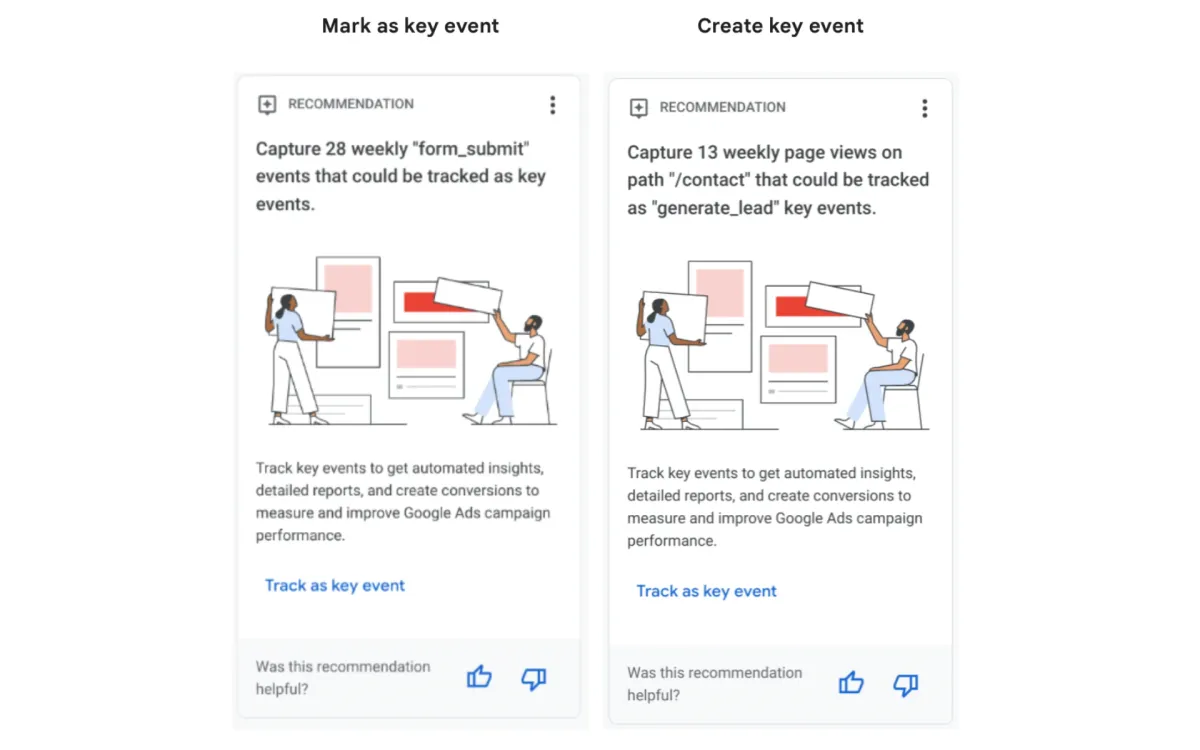
Two days ago, on December 5, 2024, Google Analytics unveiled new functionality to help marketers track their most important business metrics more efficiently. According to the official Google Analytics documentation, the platform now offers streamlined recommendations for key event tracking through two distinct features.
The first major improvement centers on event identification. According to Google's announcement, the new "Mark as key event" recommendation automatically detects existing events within a property that could provide valuable insights. When identified, marketers can designate these events as key metrics with a single click, eliminating multiple manual steps previously required.
Complementing this capability, Google Analytics introduced a "Create key event" recommendation system. This feature analyzes page view data to suggest new event tracking opportunities. The system identifies specific page views that merit tracking and enables immediate creation and key event designation through a unified one-click process.
These enhancements serve multiple analytical purposes. The streamlined workflow helps marketers establish comprehensive event tracking while maintaining data accuracy. The automated identification reduces the technical complexity traditionally associated with event setup.
The business impact extends beyond simplified workflow. According to the documentation, key events designated through these recommendations generate automated insights through the Analytics platform. These insights provide deeper understanding of user behavior patterns and conversion paths.
From a technical implementation standpoint, the new recommendations appear in three primary locations within the Google Analytics interface: the Home page, Insights hub, and Reports snapshot. This strategic placement ensures visibility across different analysis workflows.
The timing of this release aligns with broader industry shifts toward more efficient campaign measurement. Marketing teams face increasing pressure to demonstrate return on investment while managing complex multi-channel campaigns. Automated event recommendations help address these challenges by reducing implementation friction.
For integration with advertising platforms, the documentation indicates that key events can be used to measure and optimize Google Ads campaign performance. This direct connection between analytics and advertising platforms enables more granular campaign optimization based on designated key events.
The underlying technology leverages Google Analytics' existing event tracking infrastructure while adding intelligent suggestion capabilities. This maintains compatibility with current implementations while extending functionality through machine learning-powered recommendations.
Looking at measurement implications, the streamlined approach helps ensure consistency in event tracking across properties. By suggesting specific events for key status, the system promotes standardized measurement practices aligned with business objectives.
The technical architecture supporting these recommendations operates at the property level, meaning individual properties maintain control over which suggestions to implement. This granular control helps maintain measurement governance while benefiting from automated suggestions.
For marketers focused on conversion optimization, the new system provides clearer visibility into critical user interactions. By automatically identifying potential key events, teams can more quickly establish baseline metrics for optimization efforts.
From a data quality perspective, the one-click implementation reduces the risk of configuration errors that could impact measurement accuracy. The automated nature of the recommendations helps maintain consistent tracking parameters across events.
Implementation requires no additional code changes on websites or applications. The recommendations leverage existing Google Analytics tracking configurations, making adoption straightforward for marketing teams already using the platform.
The documentation emphasizes that these recommendations appear contextually based on property-specific patterns. This targeted approach helps ensure suggested key events align with actual business measurement needs rather than generic templates.
For organizations managing multiple properties, the standardized recommendation system helps maintain consistent measurement approaches across properties while adapting to individual property characteristics.

